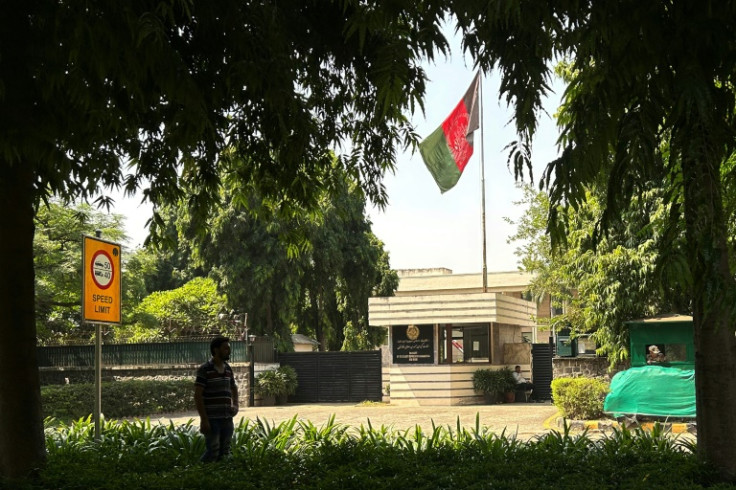A 'Turning Point' In Strategic Relationship: Afghan Embassy In New Delhi Closes Citing Challenges From India

KEY POINTS
- Diplomats, appointed two years ago by the former Afghan government, remained in India after the Taliban takeover
- The Afghan embassy announced its closure Friday citing lack of adequate support from the Indian government
- The decision comes after an announcement about the cessation of operations in September
Afghanistan's embassy in India has announced its permanent closure due to "persistent challenges from the Indian government."
Diplomats, who were appointed before the Taliban stormed back to power two years ago, failed to secure visa extensions from their Indian hosts.
There are no diplomats from the Afghan Republic remaining in India. Ambassador Farid Mamundzay and others who served at the Embassy of the Islamic Republic of Afghanistan have safely "reached third countries," the embassy said in a statement Friday.
India has not recognized the Taliban government and evacuated its own staff from Kabul ahead of the U.S. withdrawal from Afghanistan in 2021. Despite the change in power, the Indian government allowed the Afghan embassy in Delhi to function as an extension of the previous government.
Ambassador Mamundzay and the mission staff remained in New Delhi, issuing visas and handling trade matters.
"We are still representing the former republic, our former democracy. We are not taking orders from [the Taliban]," Mamundzay said last year.
The black, red and green tricolor of the previous Afghan national flag — the Taliban replaced them with their white banner bearing the black inscription of the Shahada, the Islamic declaration of faith, after retaking the country — is still seen in Ambassador Mamundzay's office in New Delhi.
The embassy "functioned as a symbol of resistance to the Taliban, albeit nominally," Prof. Shanthie D'Souza, founder and president of Mantraya, an independent research forum, told International Business Times.
However, it eventually became a challenge for diplomats of the Afghan Republic to continue functions without proper backing.
"It is impracticable for the Afghan embassy to function under the Republican flag given the lack of resources from any source, internal bickering and recurrent pressure from the Taliban who want to appoint their own people," D'Souza said. "The power struggle within the embassy combined with the exit of diplomats who were seeking asylum in third countries has led to a power vacuum in the embassy. It is a highly unsustainable state of affairs, which eventually culminated in the present state of affairs."
In September, the Afghan embassy announced the cessation of operations due to the lack of "crucial support" and the persistent challenges from the Indian government.
"Unfortunately, despite an eight-week wait, the objectives of visa extension for diplomats and a shift in the Indian government's conduct were not realized. Given the constant pressure from both the Taliban and the Indian government to relinquish control, the embassy faced a difficult choice," the embassy said Friday.
Press Statement
— Farid Mamundzay फरीद मामुन्दजई فرید ماموندزی (@FMamundzay) November 24, 2023
FOR IMMEDIATE RELEASE
Date: 24th November, 2023
The Embassy of the Islamic Republic of Afghanistan announces permanent closure in New Delhi.
The Embassy of the Islamic Republic of Afghanistan in New Delhi regrets to announce the permanent closure of its 1/6 pic.twitter.com/3WXSwWhJTu
The diplomats of the Afghan Republic have handed the mission and its impending fate solely over to the Indian government.
"The letter released by the embassy outlines the pressure from both the Indian government as well as the Taliban and the former's inability to address certain concerns as the reason for this closure. Back in October when the Afghan embassy had raised the issue of lack of support from India, the MEA [Ministry of External Affairs] had refuted those allegations and assured that India will continue to assist the Afghan people," Shivam Shekhawat, a junior fellow at the Indian think tank Observer Research Foundation, told IBT.
"Now, the diplomats of the former republic have placed the onus on the Indian government as to how it wants to take this forward - i.e. either keep the mission closed or consider alternatives. While New Delhi has not formally recognized the Islamic Emirate, its policies in the last two years has made its balancing act much more complicated," she added.
The current situation could also be a vantage point for the Taliban government to negotiate with India and have personnel of their choice appointed in New Delhi.
Last year, India announced it had deployed a "technical team" at the embassy in Kabul "to closely monitor and coordinate the efforts of various stakeholders for the effective delivery of humanitarian assistance."
"That will constitute a challenge for Indian diplomacy. The existing Afghan consulates have come under similar Taliban pressure. Till now, those have been able to function under the Republican flag and carry on their normal operations," D'Souza said.
Shekhawat noted that the decision taken by the Afghan diplomats is also a "significant turning point" in the India-Afghanistan strategic relationship.
After the Afghan embassy raised concerns about the inadequate support, the apparent lack of response from India's foreign ministry reflects the evolving relationship between New Delhi and Taliban-led Kabul.
"The opening of a technical mission in Kabul to facilitate the delivery of humanitarian aid, the failure to allow Afghan students to return to the country, the reports about Taliban attending an online course offered by the MEA and New Delhi's incremental engagement with the de facto regime in Kabul had already raised concerns about how India's policy will adversely impact its commitment to the Afghan people," Shekhawat said. "The problems raised by the embassy and the lack of sufficient response from the MEA reflects the priority that India accords to the issue."
© Copyright IBTimes 2024. All rights reserved.





















